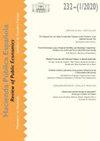经济衰退、内生政府政策和福利案件
IF 0.7
4区 经济学
Q3 ECONOMICS
Hacienda Publica Espanola-Review of Public Economics
Pub Date : 2017-03-01
DOI:10.7866/HPE-RPE.17.1.4
引用次数: 13
摘要
政府可以缓和商业周期对福利支出的影响。根据政治成本和失业程度的不同,他们可能会在接受申请的比例下降、福利水平下降或两者的某种组合之间做出选择。这篇论文的动机是这种关注,将大量关于福利案件负荷决定因素的文献和应用于福利计划设计的公共选择理论的基本原理编织在一起。本文基于加泰罗尼亚政府最低收入计划(PIRMI)的数据。我们使用自回归分布滞后模型发现,即使在失业率高企且不断增长的背景下,该计划的慷慨程度也清楚地预测了福利的领取。我们还发现失业率增长与被拒绝的申请比例之间存在相当强的相关性,以及福利水平与被拒绝的比例之间存在权衡关系。本文章由计算机程序翻译,如有差异,请以英文原文为准。
Economic Downturns, Endogenous Government Policy and Welfare Caseloads
Governments can soften the impact of the business cycle on welfare spending. Depending on the political costs and the extent of unemployment, they might choose between a decrease in the proportion of accepted applications, a decrease in the level of benefits, or some combination of the two. This paper is motivated by this concern, weaving together the intensive literature on the determinants of welfare caseloads and the fundamentals of public choice theory applied to the design of welfare programs. The paper is based on data from the minimum income program of Catalonia’s government (PIRMI). We use autoregressive distributed lag models to find that the generosity of the program is clearly predictive of the receipt of benefits even in contexts of high and growing unemployment rates. We also find a fairly strong correlation between unemployment growth and the proportion of rejected applications and a trade-off between the level of benefits and rejections.
求助全文
通过发布文献求助,成功后即可免费获取论文全文。
去求助
来源期刊

Hacienda Publica Espanola-Review of Public Economics
Economics, Econometrics and Finance-Finance
CiteScore
0.90
自引率
14.30%
发文量
14
期刊介绍:
Hacienda Pública Española/Review of Public Economics welcomes submissions on all areas of public economics. We seek to publish original and innovative research, applied and theoretical, related to the economic analysis of Government intervention. For example, but not exclusively: Taxation, Redistribution, Health, Education, Pensions, Governance, Fiscal Policy and Fiscal Federalism.
In addition to regular submissions, the journal welcomes submissions of:
-Survey Reviews, containing surveys of the literature regarding issues of interest in the Public Economics field;
-Policy oriented reviews, showing the current contributions of Public Economics in relation to relevant contemporary issues affecting public decision-makers in the real world (Policy Watch);
-Comments of previously published articles. Contributions to this section should be limited to a maximum of 2 000 words (12 pages). If deemed adequate, the authors of the commented article will be given the opportunity to react in a Reply. Both Comment and Reply will be published together.
Articles for the Survey Reviews and Policy Watch section are subject to the same double blind reviwing procedure. The adequacy of Comments submitted for publication will be evaluated by the Executive Editors.
 求助内容:
求助内容: 应助结果提醒方式:
应助结果提醒方式:


